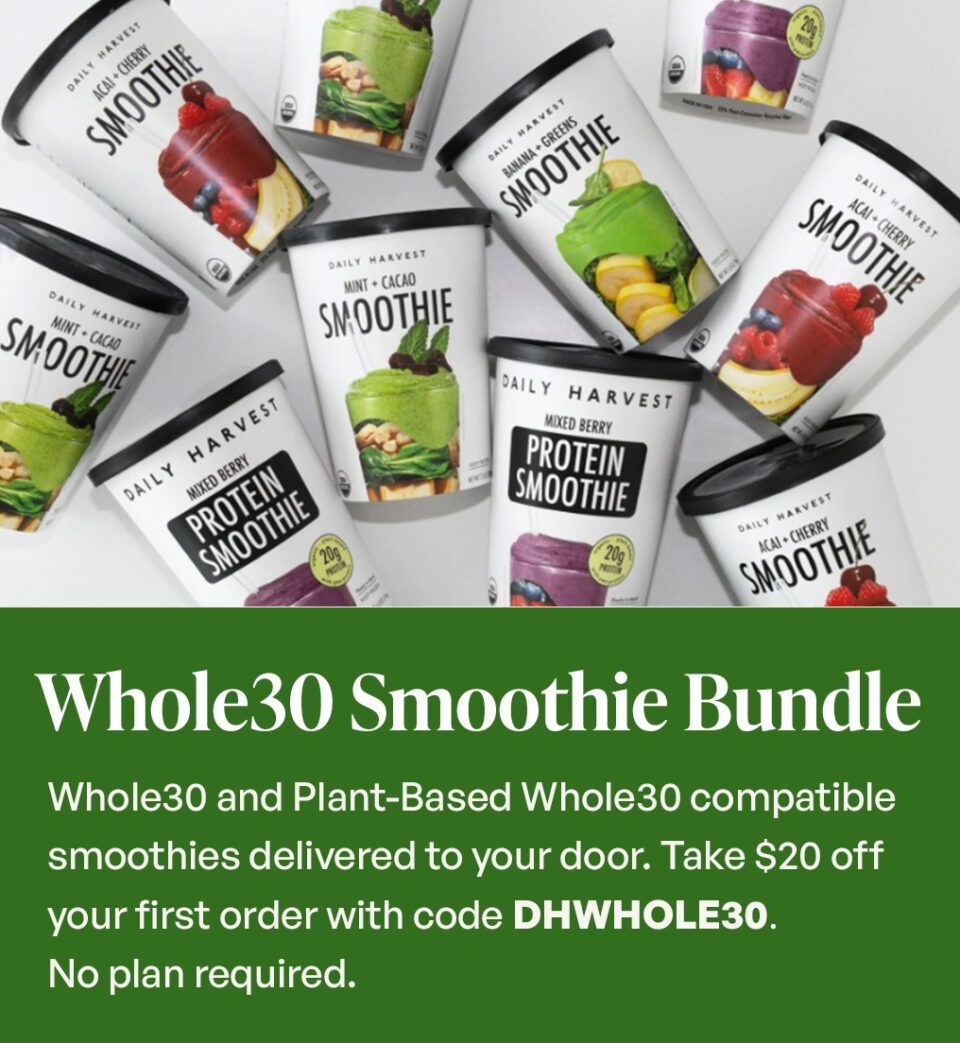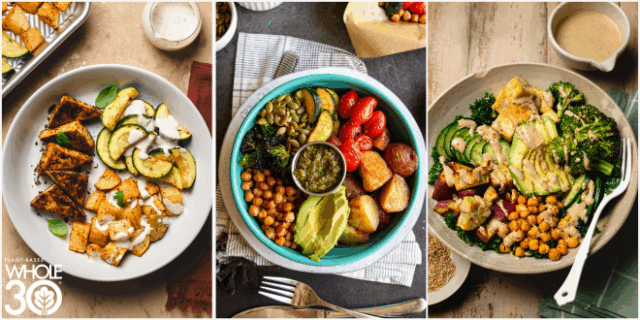Article by Registered Dietitian Stephanie Greunke
You’ve signed up to do the Plant-Based Whole30, and you’re excited to get started! You’ve read through our Protein resource highlighting the importance of plant-based protein during your 30-day reset, and you’re on board. However, there’s one section that leaves you a little confused: our stance on plant-based meat alternatives.
We get it. Let us explain…
What are Plant-Based “meats” anyway?
Plant-based meats are processed meat alternatives designed to resemble animal protein. The industry serves a few purposes:
- Helping vegetarians and vegans increase their dietary protein intake
- Helping people increase their variety of plant-based protein sources
- Satisfying the palate of those who want to cut down on or eliminate meat from their diet
- Making it easier for vegetarians and vegans to participate in social activities
Before the recent surge in popularity of plant-based diets and the corresponding demand for food manufacturers to develop more plant-based products, mainstream plant-based meats were limited to highly-processed options made from wheat gluten, soy protein isolate, and soy protein concentrate. Other options offered combinations of legumes, vegetables, and whole grains, but were often limited in protein.
Food manufactures have come a long way in developing plant-based meat alternatives. New brands have entered the market, excited to offer something for savvy consumers desiring less processed options, made from ingredients they feel good about. This includes making plant-based meats that are gluten-free and swapping soy protein isolate and soy protein concentrate for other plant-based protein sources, like pea protein and hemp seeds.
Whole30’s stance on plant-based meats
Plant-based meat products are, in a word, controversial. While many health experts and the general public often label foods as “good” or “bad,” we don’t do that here. Instead, we take time to develop our stance using a three pronged approach: assessing what’s been demonstrated in the scientific literature, using our clinical experience based on observing millions of people who have completed a Whole30, and thinking critically about what one set of guidelines will be maximally effective for the vast majority of people who try our program.
As a Registered Dietitian, I’ve spent considerable time researching the plant-based meat products that are currently available. As a team, we’ve discussed the role these products could play in supporting adequate protein intake on the Plant-Based Whole30 program, supporting the protein needs of those who are allergic to or intolerant of soy or legumes, who want more variety in their plant-based diets, or who were looking for a chewable alternative to pea protein powder. Finally, we met with our team of scientific advisors (including fellow registered dietitians, medical doctors, and functional medicine practitioners) to discuss the role plant-based meats could play in a healthy Whole30 approach.
In summary, we believe there is a place for meat alternatives on the Plant-Based Whole30, but not all plant-based products will meet our high standards.
What to look for in plant-based meats
The best meat alternatives for the Plant-Based Whole30, per the Plant-Based Whole30 program rules, include the following characteristics:
Protein is sourced from compatible protein options, including:
- Pea protein
- Hemp protein
- Lentils
- Legumes
- Nuts and seeds
- Minimally processed soy (tofu, tempeh, edamame)
The product is free from ingredients excluded in the rules, including:
- Grains, often used as a binder
- Seitan, made from wheat gluten
- Eggs, often used as a binder
- Carrageenan, often used as a binder
- Dairy, such as cheese included for flavor
- Added sugar in all of its forms, including dextrose and maltodextrin
- Highly processed forms of soy, including soy protein isolate or concentrate, textured vegetable protein, textured soy protein, or soybean oil
Whole30 Approved® plant-based meat alternatives
In our research, we’ve identified two brands of plant-based meats that fit the high standards of a Plant-Based Whole30. These products are all Whole30 Approved, featuring our logo on the packaging and website.
- Big Mountain Foods: Lion’s Mane Mushroom Crumble (featuring pea protein, split peas, and hemp seeds)
- Big Mountain Foods: Cauli Crumble Veggie Grounds (featuring yellow split peas and sunflower seeds)
- Abbot’s Butcher: “Chorizo” (featuring pea protein)
- Abbot’s Butcher: Ground “Beef” (featuring pea protein)
- Abbot’s Butcher: Ground Chopped Chick’n (featuring pea protein)
These products also work equally well for the Original Whole30, allowing those who do eat animal products add more variety and plant-based options to their program.
Plant-based meat (and egg) alternatives that don’t meet our requirements
These are products that do not meet the Plant-Based Whole30 program rules. These products may be a fantastic fit for your plant-based lifestyle once your Whole30 is over, and we’re not (of course) saying any of these products are “bad.” They simply contain ingredients that aren’t compatible with the rules of the Plant-Based program.
It would be impossible (no pun intended) for us to create a comprehensive list here, as new products roll out often and the list of plant-based meat alternatives are extensive. We’ve reviewed some of the most popular here, and called out some of the ingredients often included that aren’t compatible with the program, to help you improve your label-reading skills.
Remember–unless you see the Whole30 Approved logo on the packaging, always read your labels, and compare the ingredients listed against the Plant-Based Whole30 program rules.
- Impossible Foods: Many products contain soy protein isolate/concentrate and added sugar
- Beyond Meat: Most products contain rice protein or flour, some contain gluten
- Boca: Many products contain gluten, soy protein isolate/concentrate
- Morningstar Farms: Many products contain gluten, soy protein isolate/concentrate
- Gardein: Many products contain gluten, soy protein isolate/concentrate
- JADA: Many products contain gluten
- Loma Linda: Many products contain textured soy protein
- Daring: Their “chicken” is based on soy protein concentrate
- Quorn: Many products contain gluten and added sugar, some of their non-vegan products include eggs, read your labels
- Just Egg: Contains added sugar and tapioca syrup
*Note: We will continue to re-evaluate this list, as new product innovations arise, and formulations may change.
Final thoughts
We believe that plant-based meat alternatives can healthfully support adequate protein needs on the Plant-Based Whole30. While we’ve already vetted two brands for you, Abbot’s Butcher and Big Mountain Foods, that’s not to say that those are the only products that are compatible, nor that you should use them during your 30-day program. These can be a nice way to add variety, texture, and additional protein to your program, but you can certainly complete a delicious, satisfying, health-promoting Whole30 without them.
And as always, listen to your gut–literally. If any of these products aren’t working well for you, whether it’s increased gut symptoms like bloating, skin breakouts, or other unwanted symptoms, please discontinue using that product, try a different plant-based meat alternative, or simply enjoy the variety of other plant-based protein options available to you.















